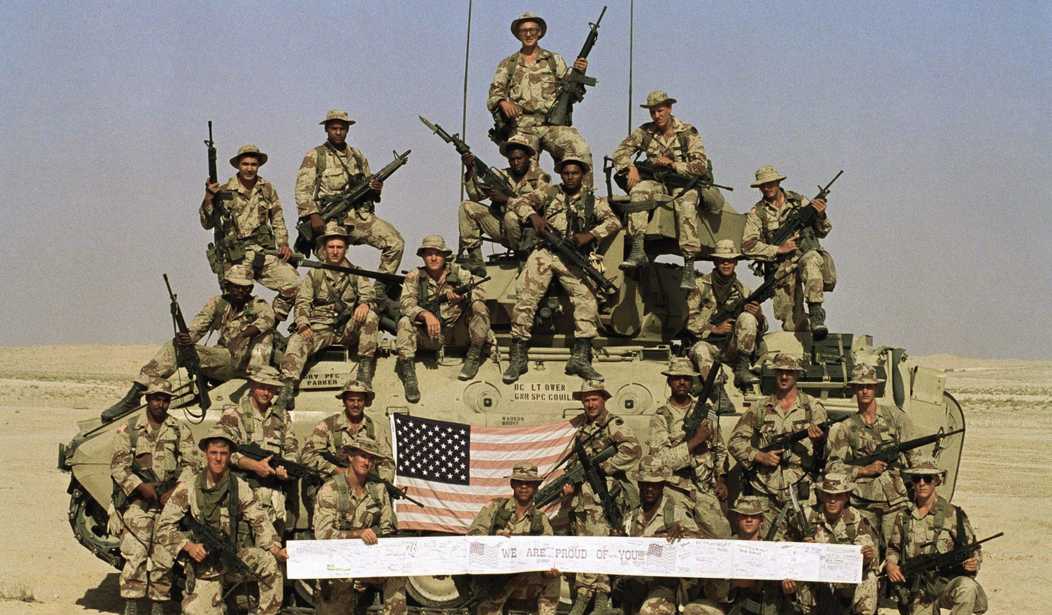War movies are a staple of the film industry, something they’ve cranked out for decades and decades. While they tend to be expensive, they also tend to have a good return on investment — as long as you keep the preaching to a minimum.
However, with the release of the film 12 Strong, liberal self-appointed elite such as The Intercept’s Peter Maass are troubled by a portrayal of the bravery of U.S. soldiers. He’s even upset by the concept that Americans are the good guys and that Islamic terrorists are humanity’s enemy.
“Some of the biggest war movies of the post-9/11 era don’t just show violence in ways that are often gratuitous and occasionally racist. They model a cliched form of masculinity that veers from simplistic to monstrous,” Maass writes.
He adds: “That’s when it becomes necessary to say that movies can create or reinforce narratives of history and gender that influence what people think and what they do. Boys and men develop their notions of masculinity from a variety of sources that include the films they watch (the extent to which this is true is, of course, open to debate).”
“The time has come for Hollywood to turn away from war movies that, while satisfying to both a studio’s bottom line and a flag-waving concept of patriotism, perpetuate a model of masculinity that does violence to us all.”
The thing is, as the film illustrates, masculinity is not outdated. Not at all. It will never be.
This particular brand of masculinity may well influence boys and men who watch it — and that’s wonderful. It creates a model of behavior that holds up courage in the face of evil as a quality to be honored.
But people like Maass don’t understand that. They value war movies that show damaged veterans, or unprincipled troops stealing large sums of gold — both things Maas explicitly celebrates in his choice of “good” war movies.
He seems to quiver at the idea of the American fighting man actually being good at war, and moral.
Don’t get me wrong, stories about the breadth of the military experience are important, too. We need to understand what some veterans go through in the aftermath of combat, and that some are not honorable. But let’s never pretend that it’s a universal theme among those who served.
But Maass doesn’t grasp that, maybe because he’s never served anything except a guest at a dinner party. Maas continues: “What matters is that well into the second decade of our forever war, the combat movies that populate our multiplexes and our minds are devoted to a martial narrative of men-as-terminators that should have been strangled at its birth a long time ago.”
Does he not recognize where these portrayals of “men-as-terminators” draws its inception? Look to men such as Larry Thorne, one of the founding Green Berets, or David Hackworth. While Audie Murphy may never have looked like the “man-as-terminator” type, his exploits are well-known as exactly that.
Examine the combat records of the 442nd Regimental Combat Team: 21 Medal of Honor recipients, many of them awarded posthumously to men who repeatedly (and successfully) charged machine gun nest across broken terrain and hills.
The courage shown in these films is not myth. This kind of valor should inspire our boys. Bravery has never been the cause of any ill in our nation’s history, and it never will be. Rather it is a lack of bravery which has caused so many of our nation’s woes.
The absence of courage is what makes for hard times amongst our citizenry. Courage to do right, to act right, to be right. Perhaps Maass cannot bring himself to be so courageous, and does not wish to feel inadequate.
Allow me to quote my good friend Jonathan LaForce:
Peter, let me give you a life tip: next to the likes of Major Mark Nutsch, damn near all of humanity feels inadequate. Even I do.
And I’ve earned the right to not only be a Corporal of Marines, but bear the title “veteran” and all which comes with it. The point of such movies, such epics, is that we continue to draw and find from within their pages the inspiration to drive forward. Men have done so for centuries, women have done so for centuries. And they will continue to do so, till men no longer go down to the sea in ships and do business upon great waters. From whence did we see the likes of Leonidas and his Spartans, but it was inspired in no small part by the stories of Odysseus, Achilles, Ajax, and Hector.
I agree completely. As a former Navy corpsman, I’ve put my name on the dotted line as well. While my service happened during peacetime, movies like this reminded me of what was expected. Maybe not by the likes of Maass, but by my brothers-in-arms of the time. We all did, and while I don’t know that I would have acted as bravely as those figures on the big screen, I know I’d have been terrified of not doing what needed to be done because of those movies.
So no, they don’t need to die. They need to be celebrated as they always have been.
They shall grow not old, as we that are left grow old:
Age shall not weary them, nor the years condemn.
At the going down of the sun and in the morning
We will remember them









Join the conversation as a VIP Member